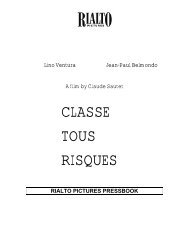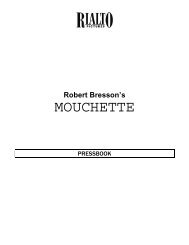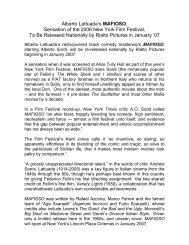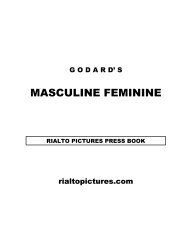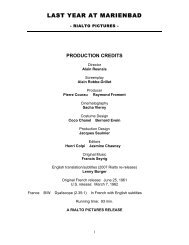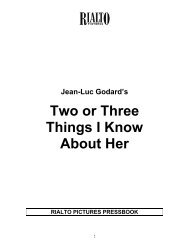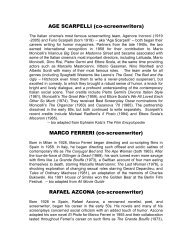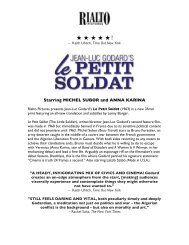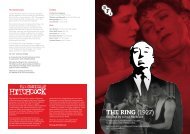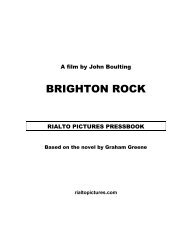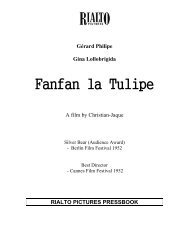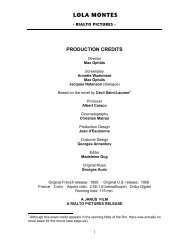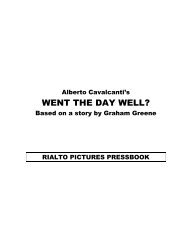Jean-Luc Godard's Two Or Three Things I Know ... - Rialto Pictures
Jean-Luc Godard's Two Or Three Things I Know ... - Rialto Pictures
Jean-Luc Godard's Two Or Three Things I Know ... - Rialto Pictures
You also want an ePaper? Increase the reach of your titles
YUMPU automatically turns print PDFs into web optimized ePapers that Google loves.
Juliette swings throughout the film from conversation to her own thoughts—or<br />
occasionally to Godard speaking through her mouth….For example, early in the<br />
film, Juliette's husband comes into the kitchen to announce that their friend<br />
Roger is going home. Juliette replies, "Right, I'm coming," and then, without any<br />
gear switching, she immediately continues her thoughts from earlier in the scene:<br />
"You try often to find, to analyze the meaning of words, but one is too easily<br />
impressed by them. You've got to admit that nothing is simpler than thinking that<br />
this or that thing is just a matter of course."<br />
One might think that this mixture of commentary, internal monologue, ordinary<br />
dialogue, the lengthy examination of objects, the brief flashes of the cranes and<br />
the bulldozers, would make the film very difficult to follow. And yet it doesn't. First<br />
of all, we are given a thread to hang on to—a day in the life of Juliette Janson<br />
and then that day is, as it were, blocked out. We begin after dinner in her flat.<br />
The next morning Juliette sets off for Paris, leaving her child in the care of a little<br />
old man who uses his meagerly furnished flat as a kind of nursery-cum-brothel.<br />
(In one room he looks after the children, telling them fairy-tales; while another he<br />
rents out by the half-hour to couples who have nowhere else to go. Everyone<br />
pays in tinned goods.) The next sections show Juliette at a dress shop, then in<br />
the bar where the prostitutes hang out. Next, there is a long scene at a smart<br />
hotel where Juliette and a friend take care of a rich American client, just back<br />
from Vietnam. (John Bogus, war correspondent in Saigon for an Arkansas daily,<br />
is played by the late Raoul Levy in a curious mixture of accented English and<br />
French, as he puts forth the curious reflection that since one dead Vietcong costs<br />
the Americans a million dollars. President Johnson could easily afford to have<br />
20,000 whores for himself instead.) From there we go to her hairdresser, to<br />
Robert's garage, then to a cafe where Robert awaits Juliette, and then home<br />
again.<br />
These nine 'chapters' help to give the work a kind of shape….Because there is a<br />
coherent master idea behind <strong>Two</strong> or <strong>Three</strong> <strong>Things</strong> I <strong>Know</strong> About Her it succeeds<br />
on all levels. Content and form are played off one against the other in an entirely<br />
satisfying and rewarding way, each one pushing the other forward to give the film<br />
a strength and an impetus that makes it for me the summit of <strong>Godard's</strong> work.<br />
But also, one must recognize a deeper strain of pessimism in Godard which<br />
applies not only to economic and social factors, but to life itself. Juliette, alone in<br />
her bedroom, muses: "To define oneself in a single word: Not yet dead." An older<br />
woman in the beauty parlor suddenly speaks from the depths of her soul—and<br />
perhaps <strong>Godard's</strong> too: "I am very careful crossing streets. I think of the accident<br />
before it can happen. And that my life might stop right there ... Unemployment...<br />
Sickness ... Old Age ... Death ... Never ... I have no plans for the future, for my<br />
horizons are closed."<br />
"Well, here at last." Juliette replies: "Where?" Robert: "Home." Juliette: "And then<br />
10



